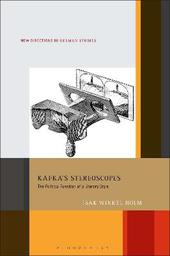
|
Kafka's Stereoscopes: The Political Function of a Literary Style
Hardback
Main Details
Description
In 1911, Franz Kafka encountered the Kaiser Panorama: a stereoscopic peep show offering an illusion of three-dimensional depth. After the experience, he began to emulate the apparatus in his literary sketches, developing a style we might call "stereoscopic," juxtaposing, like the optical stereoscope, two images of the same object seen from slightly different perspectives. Isak Winkel Holm argues that Kafka's stereoscopic style is crucial to an understanding of the relation between literature and politics in Kafka's work. At the level of content, the stereoscopic style offers a representation of the basic order of a specific community. At the level of form, the stereoscopic style is structured as the juxtaposition of two dissimilar images of the same community. At the level of function, finally, the style provokes a reconsideration, and perhaps even a reconfiguration, of the social order itself. With insights from literary studies, philosophical aesthetics and political theory, Kafka's Stereoscopes offers a detailed but highly readable argument for the relevance of Kafka's literary works in today's political reality.
Author Biography
Isak Winkel Holm is Professor of Comparative Literature at University of Copenhagen, Denmark. His previous publications include Tanken i billedet. Soren Kierkegaards poetik (Thinking in Images: The Poetics of Soren Kierkegaard, 1998) and Stormlob mod graensen: det politiske hos Franz Kafka (Assault on the Border: The Political in Franz Kafka, 2015).
ReviewsScholars and students alike will find much to provoke thought and instigate intriguing classroom discussions ... Holm is erudite and passionate about Kafka's life and works. * Monatshefte * Isak Winkel Holm brings a fresh perspective--a stereoscopic perspective--to the perdurable, vexatious, and fascinating question of how to reconcile Kafka's allegedly 'dream-like' stories with their patent involvement in what Holm calls 'the political,' the question of the foundations of community. Holm's brilliant, exhilarating readings are supported by an exceptionally rich knowledge of literary theory and scholarship in several languages. * Stanley Corngold, Professor Emeritus of German and Comparative Literature, Princeton University, USA * By raising the game from cultural studies to political poetics, by moving on from 'Kafka and the stereoscope' to 'Kafka as stereoscope,' this book wields an axe against the frozen sea of Kafka studies. * Benno Wagner, Professor of Global Studies, Department of Eastern and Western Languages, Zhejiang University, China * In this brilliant and original study, Isak Winkel Holm illuminates what Kafka called his uncanny 'dreamlike inner life,' and how it relates to the Prague author's external circumstances. In lucid and lively prose, Winkel Holm produces nuanced literary readings of Kafka's doubled vision--or what he terms his 'stereoscopic literary style'--to challenge the traditional picture of Kafka as an apolitical and solipsistic writer. * Vivian Liska, Professor of Literature and Philosophy, University of Antwerp, Belgium *
|